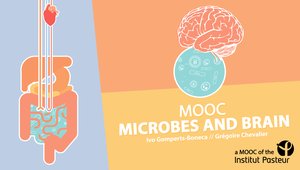Grégoire Chevalier
Grégoire Chevalier is a researcher at the Institut Pasteur, studying the interplay between the microbiota and the host.

He pursued his thesis under the supervision of Pr. Daniel Gonzalez-Dunia and Pr. Roland Liblau, at the Centre of Pathophysiology of Toulouse Purpan, at the crossroad of immunology and neurosciences, studying the mechanisms of neuronal damage caused by neuroinflammation. He obtained his PhD in neuroimmunology in 2011 from Toulouse III University, France. He then joined the Institut Pasteur in Paris as a postdoctoral fellow within the lab of Pr. Gérard Eberl. He is an active member of a consortium on "Microbes & Brain" at the Institut Pasteur, which brings together neuroscientists, immunologists and microbiologists of the institute.
His research focuses on the interaction between commensal bacteria and the host, especially the brain. In particular, he is interested in the signaling molecules released by the microbiota and potentially detected by the brain, as well as the role of the intestinal microbiota in regulating responses to stress, an influence that could be important in pathologies such as major depressive disorders and bipolar disorders.
Grégoire Chevalier est chercheur à l'Institut Pasteur, il étudie l'interaction entre le microbiote et l'hôte. Il a poursuivi sa thèse sous la supervision du Pr. Daniel Gonzalez-Dunia et du Pr. Roland Liblau, au Centre de Physiopathologie de Toulouse Purpan, au carrefour de l'immunologie et des neurosciences, il étudie les mécanismes des dommages neuronaux causés par la neuroinflammation. Il a obtenu son doctorat en neuroimmmunologie en 2011 à l'Université Toulouse III, France et a ensuite rejoint l'Institut Pasteur à Paris en tant que chercheur postdoctorant au sein du laboratoire du Pr. Gérard Eberl. Il est membre actif du consortium "Microbes & Brain" à l'Institut Pasteur, qui regroupe les neuroscientifiques, les immunologistes et les microbiologistes de l'institut.
Ses recherches se concentrent sur l'interaction entre les bactéries commensales et l'hôte, en particulier le cerveau. En particulier, il s'intéresse aux molécules de signalisation libérées par le microbiote et potentiellement détectée par cerveau, ainsi qu’au rôle du microbiote intestinal dans la régulation de la réponse au stress, une influence qui pourrait être importante dans des pathologies telles que les troubles dépressifs majeurs et les troubles bipolaires.


